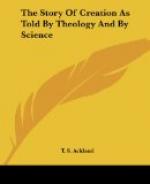In the opening of the second chapter we are told that God rested on the seventh day from all His work, and His rest is spoken of in such a way as to carry our thoughts at once to the Fourth Commandment. In that commandment the duty of hallowing a seventh portion of our time is based on the fact that “in six days the Lord made heaven and earth, the sea and all that in them is, and rested the seventh day.” But the analogy entirely fails unless the days of the Creator’s work bore the same proportion to the day of His rest which man’s six days of labour bear to his Sabbath. Now we are expressly told in other parts of Scripture that the Divine Sabbath is not yet ended (Heb. iii. iv.), and we are led to infer that it will not end till He that sitteth upon the throne shall say, “Behold I make all things new.” If then the Sabbath of the Creator is measured by thousands of years—the whole duration of man upon the earth—it follows that the days of His work must have been of corresponding length.
One more indication, so strong that in itself it seems sufficient to decide the question, is to be found in the 4th verse of the second chapter. [Footnote: It is not unusual with critics of the German school to assert that this is an independent account of the Creation. But the assertion does not appear to have any valid foundation. The supposed grounds for it are well discussed in the “Speaker’s Commentary,” vol. i. p. 23, and in “Aids to Faith,” Essay v., Sections 2, 4, 5. It has already been pointed out that the supposed variations in order rest entirely on the translation.] In that verse all that is ascribed to the six days in the preceding chapter is summed up as the work of a single day. If then the word is used in a natural sense in the first chapter, it is clearly used in an extended sense in the second chapter. But if it had been used in a natural sense in the first chapter, there would have been no need whatever for its use here. Its place would have been taken—and most appropriately—by the word [Hebrew script], a week, with which Moses was familiar (ch. xxix. 28; Deut. xvi. 10). Its use here would have connected the weekly division of time with the Creation, and as its presence would have been thus strongly significant, its absence is a no less significant indication that the six days spoken of in the preceding chapter are something very different from six natural days.




